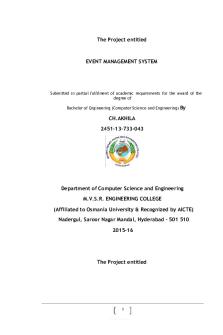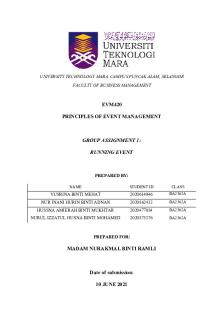Event Logistics and Risk Management PDF

| Title | Event Logistics and Risk Management |
|---|---|
| Author | Heather Kellie |
| Course | Events Management |
| Institution | The Robert Gordon University |
| Pages | 7 |
| File Size | 324.4 KB |
| File Type | |
| Total Downloads | 67 |
| Total Views | 137 |
Summary
Lecturer: Katherine Jones...
Description
Event Logistics & Risk Management What is Logistics? The Right Product The Right Place The Right Time Arriving on time In place it should be & good condition Doesn’t just happen! Supply Chain Flow of materials, good and services by definition In events management - flow of physical goods, information, people & finance to point of use Lead Times, Contract Negotiation, Licensing, Permits, Insurance Required careful planning & organisation Further Examples Last minute venue challenge Last minute venue change Nobody turns up The weather Not enough space Not enough seats No food Queues! Project Management “A project is a complex non routine…effort limited by time, budget, resources & performance, specifications, designed to meet customer needs” (Gray & Lawson, 2000 in Bowdin, 2011 p258) Benefits of Project Management Avoids over reliance Reporting facilities Splitting of roles Familiarity Total Quality Management Project Management & Events (Traditional Project depends on a solid definition of asset) Events as an asset? Events are not defined & can be emerging… Taking new opportunities The Wow factor Volunteers difficult Number of stakeholders Fluctuating Finances Event Design (Shone & Parry, 2010)
Project Management & Supply Chain Complexities of the ‘supply chain’ Geographic spread of customers & goods Risk & security considerations Regulatory & compliance hurdles Increased attendee/participation/client expectation Shortened lead times A huge number of players Back to Supply Chains - What supply chains have you encountered today? Supply Logistics Customer Ticketing Queuing system Transportation What can you fo to help visitors? Product Portfolio Transport Accommodation Entertainment Facilities Venue - size, flexibility, lead time, safety, transport links… Catering - licensing, vendor selection, infrastructure, storage, resources, payment facilities Technical - cost, transport, fit with event, design, storage (pyrotechnics), tech. support, operational work… Lets Consider Catering… In house/outsource Menu choice Stock (food & drink) & storage Timings Customer Knowledge/ Expectations E.g.
28,000kg of strawberries & cream are consumed during the Wimbledon fortnight each year The strawberries are kept fresh - they are picked the day before their consumption at the event! Eating strawberries & cream is an integral part of the experience of Wimbledon!
Supply Logistics
Flow - steady & continuous Movement of audience - multi site & large venues Evaluation & anticipation of peaks e.g. arrival, programme highlights, exist & emergency Linked closely with event programming Communication The act of transferring information from one place, group or person to another Complex & various forms Event Management uses a range of pre, during & after: Pre Event Meetings (Verbal) Site Maps (Visual) Bulletins (Written) Newsletters (Written) Contracts (Formal) Integral Peers Staf Stakeholders Committees Volunteers External Audience/Customers Suppliers Venue’s Artists/Entertainments Need for Communication Plan on Site Details include name, responsibility, locations, contact number, emergency contact What information do they need? Customer Communication Signs, loudspeaker, programmes… What information do they need? On the Day… Walk through the site - ‘Gap Analysis’ (Goldblatt, 2008) Know your site - inside out Communicate with teams/committees Check locations & key times Delegate properly Deal with problems as they arise - Leadership Identify reason for problem Work steadily but take breaks Be visible, contractable, be clear Organisation is Key Logistics Summary
Important to understand logistics i.e. the movement of resources & assets to the place they are required (Right Place, Right Time = Successful Event) Supply Logistics - need to think about customer, audience flow & communications at all times (Vital for safety, security & success!
Risk Management What is Risk? A situation involving exposure to danger - probability, threat, internal/external, damage/injury/liability/loss Risk in Events - Likelihood & consequence of an event not fulfilling its objective Risk Management - Process of identifying problems, assessing them then making plans to reduce, remove or neutralise the risk (Event Scotland, 2006) ‘Hope is NOT an action plan” (Silvers, 2008 pxvii) “Because each event is diferent, no event risk manager can ever assume the position of one equation fits all” (Tarlow, 2002 pxii) “It is significantly less expensive to manage a risk prior to the event than deal with the crisis after it has occurred (Tarlow, 2002 p5) Levels of Risk Low Risk Events - often indoor & no unusual or specialist activities & those taking part & executing event have knowledge & experience of these types of events. Medium Risk Events - may be very large indoor events, locations which public do not normally attend, activities more complex. Or outdoor but no immediate or large perceived dangers. High Risk Events - involving large numbers of people in activities & locations they are unfamiliar with Little/no knowledge event/environment/activity Visible dangers if safety mechanisms ignored Small scale too - corporate team building - specialist knowledge of staf but not participants (Shone & Parry, 2013 p228) PESTLE & The Macro Environment
Types of Risk Physical -
Health & Safety problems - this is not just of those attending Natural Disasters Human Disasters - terrorist attack, overcrowding Crime Security Issues Risk of activity
Financial Lack of sponsorship Lack of ticket sales - poor feasibility testing Lack of grant sponsorship Poor budgeting - hidden/changing costs Legal bills Environmental Climate change Perceptions of the event on environment i.e. land Harsh environments & sporting events Reputational risk associated with Reputational Referred to as psychological History - previous events Loss of trust Expectations Ethics Real time efects - tech. Performance Risk An artist doesn’t show up/is late to your event - it is the headline act. Although defined as a performance risk, what are your two biggest risks from this? Phases of Risk According to The Event Safety Guide (HSE, 1999) 5 Phases of Risk Build Up - Venue design, worker selection, contractor section, construction Load In - Delivery & installation of equipment The Show - Crowd & transport management, planning for fire, first aid… Breakdown - Planning to control risk post event i.e. waste disposal
How Can We Deal with Risk? Eliminate - can you get rid of the hazard? Reduce - try a less risky option? Isolate - prevent access to hazard? Control - reduce exposure to hazard? PPE - issue projective equipment Discipline - the workforce working correctly
Some Considerations Risk can be reflective An ongoing process, integrated & emerging Work with stakeholders
Roles & responsibilities - Health & Safety Policy for your organisation, Reporting procedures, Monitoring & inspections, Method Statements Communications...
Similar Free PDFs

LOGISTICS MANAGEMENT
- 1 Pages

Logistics Management
- 2 Pages

Logistics Management
- 36 Pages

Sumup Logistics Management
- 36 Pages

Event Management System
- 79 Pages

Event Management mcq
- 37 Pages

BBA 602 Event-Management
- 35 Pages

Mini Project-Event management
- 46 Pages

Samenvatting Event Management
- 22 Pages

SRS Event Management System
- 4 Pages

Catering & Event Management
- 29 Pages

Risk Management
- 36 Pages
Popular Institutions
- Tinajero National High School - Annex
- Politeknik Caltex Riau
- Yokohama City University
- SGT University
- University of Al-Qadisiyah
- Divine Word College of Vigan
- Techniek College Rotterdam
- Universidade de Santiago
- Universiti Teknologi MARA Cawangan Johor Kampus Pasir Gudang
- Poltekkes Kemenkes Yogyakarta
- Baguio City National High School
- Colegio san marcos
- preparatoria uno
- Centro de Bachillerato Tecnológico Industrial y de Servicios No. 107
- Dalian Maritime University
- Quang Trung Secondary School
- Colegio Tecnológico en Informática
- Corporación Regional de Educación Superior
- Grupo CEDVA
- Dar Al Uloom University
- Centro de Estudios Preuniversitarios de la Universidad Nacional de Ingeniería
- 上智大学
- Aakash International School, Nuna Majara
- San Felipe Neri Catholic School
- Kang Chiao International School - New Taipei City
- Misamis Occidental National High School
- Institución Educativa Escuela Normal Juan Ladrilleros
- Kolehiyo ng Pantukan
- Batanes State College
- Instituto Continental
- Sekolah Menengah Kejuruan Kesehatan Kaltara (Tarakan)
- Colegio de La Inmaculada Concepcion - Cebu



